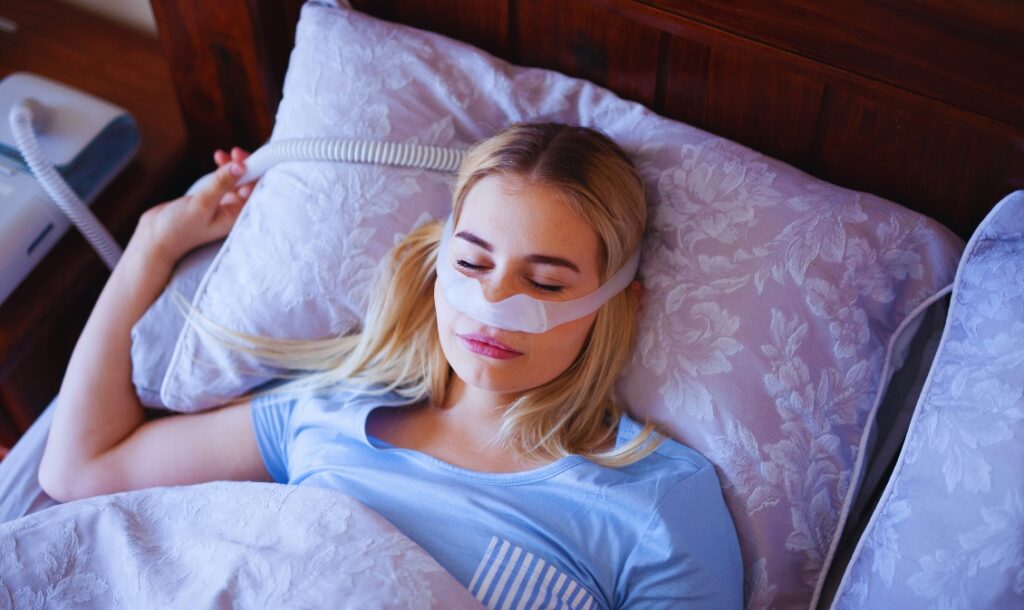
April 17, 2025, By Virginia TMJ Facial Pain and Sleep Center
Sleep apnea is a common yet often misunderstood sleep disorder. It causes breathing to stop and start repeatedly during sleep. Many people ignore the signs until their health begins to suffer. Understanding the daily life impact of sleep apnea is pertinent and essential. Millions live with sleep apnea and suffer greatly in their daily lives.
Are you one of them?
If so, this is just the right blog for you. It discusses how sleep apnea affects daily functioning—physically, mentally, and emotionally—and why early action can change lives.
What Is Sleep Apnea?
Sleep apnea occurs when breathing pauses during sleep. There are three main types: obstructive sleep apnea, central sleep apnea, and complex sleep apnea. Obstructive sleep apnea is the most common and is often linked to physical airway blockage.
Common symptoms include
- Loud snoring
- Choking or gasping at night
- Extreme daytime tiredness
Many people also wake up with dry mouths or morning headaches. These symptoms often go ignored or misattributed.
Diagnosis typically involves a sleep study at home or in a lab. This tracks breathing, oxygen levels, and sleep patterns.
Proper diagnosis is key for treatment and for reducing long-term health risks. You must consult a professional offering reliable treatment for Sleep apnea Glen Allen, where you can access local testing and care centers to start your journey toward better sleep.
How Sleep Apnea Wears You Down Physically
Sleep apnea can leave you feeling drained before your day begins. The constant nighttime interruptions lead to chronic fatigue and low energy levels. Most people struggle to get through daily routines, let alone enjoy them.
Morning headaches are another common complaint. They result from oxygen deprivation during the night, which can wear you down over time.
Your immune system also takes a hit. Poor sleep weakens your body’s defenses, making you more likely to get sick. Worse, sleep apnea raises your risk for high blood pressure, heart disease, and even diabetes. These risks make treatment non-negotiable.
Mind Fog And Mood Swings: The Mental Cost
The cognitive effects of sleep apnea are just as concerning. Many people suffer from memory lapses and poor concentration. Staying focused becomes harder, which affects decision-making and learning.
Mood swings are another major issue. People often feel short-tempered or unmotivated; ongoing exhaustion drains their emotional reserves.
There’s also a strong link between sleep apnea and mental health conditions like anxiety and depression. Sleep deprivation affects the brain’s emotional regulation. Over time, it worsens symptoms and leads to losing interest in things you once enjoyed.
The Real Impact on Work and Productivity
Let’s talk about your 9-to-5. Sleep apnea can seriously hurt your job performance. When you’re tired, it’s harder to concentrate or complete tasks efficiently. You might miss deadlines or forget important details.
As mistakes increase, so does the risk of workplace accidents. This puts you and others at risk, especially in high-responsibility roles.
It can also strain professional relationships. Colleagues may misinterpret your fatigue as laziness or disinterest.
Over time, this creates tension and missed opportunities. Addressing snoring and sleep apnea could mean the difference between struggle and success.
How It Hurts Your Relationships At Home
Your loved ones notice the impact of sleep apnea on daily life, too. Your partner might lose sleep because of loud snoring or sudden gasps during the night, leaving both of you exhausted.
Poor sleep often leads to mood changes, arguments, or emotional distance. You may feel too tired to connect, talk, or spend quality time together.
Fatigue also makes communication more challenging. Minor problems turn into big ones when everyone’s running on empty. Addressing sleep apnea benefits the entire household.
Everyday Life Becomes a Challenge
Daily life gets harder with untreated sleep apnea. Many people avoid travel because of their CPAP machine or fear of exhaustion. Even short trips feel overwhelming.
Low energy can mean skipping the gym, canceling plans, or avoiding social events, which can affect motivation.
Some turn to caffeine or energy drinks to stay alert. While this may help temporarily, it’s not a healthy solution. The key is treating the root cause: sleep apnea.
Getting Treated Changes Everything
The good news? You can take back your life. CPAP therapy helps keep your airway open during sleep. Many people see improvements within days of starting treatment.
Lifestyle changes also matter. Weight loss, healthy eating, and better sleep hygiene all help reduce symptoms. Regular exercise supports both mood and energy levels.
Once treated, sleep quality improves. You’ll wake up feeling refreshed and focused, and your relationships, mood, and daily life will all be boosted. Local care can get you on the right path for those with sleep apnea in Glen Allen.
The effects of sleep apnea reach every corner of your life. From health risks to job performance, nothing escapes its grip. Take action now if you recognize the signs—especially snoring and sleep apnea. Talk to a sleep specialist. Don’t wait. The condition is real, but it’s also treatable.
A better night’s sleep can restore your body, mind, and relationships. Sleep apnea in daily life doesn’t have to define you.
